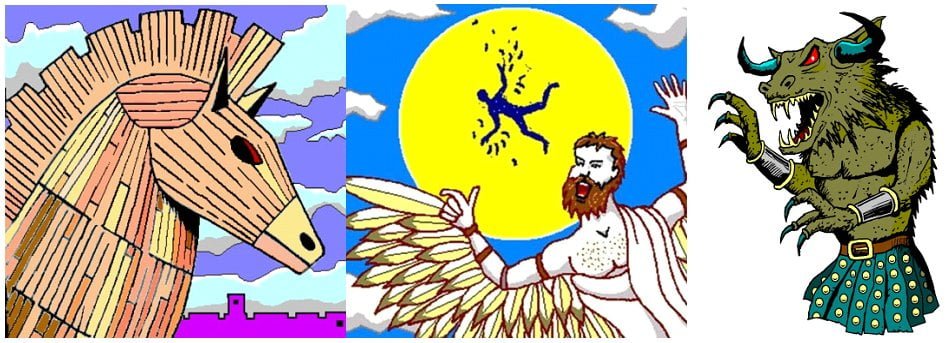
Greek legends came from very early Greek history and quickly become part of Greek culture, becoming the narrative and eventually the themes for many works of art, sculptures and ceramics.
The legend is typical of early Greek culture, as it touched on recurrent themes such as heroes on legendary quests,
conquests and wars.
Such as ORPHEUS who travelled to the UNDERWORLD to bring back his dead wife. He did this by using music to charm the spirits and then won them over with his song.
Other stories were told by Homer with ones like The Odyssey, which tells the story of Odysseus’s journey home after having battled monsters and gods. He also wrote The Iliad, in which Achilles fights the Trojans in the Trojan war, but doesn’the story of the Wooden Horse. It was the Roman poet, Virgil, who first wrote the story of how the Greeks fooled the Trojans by leaving a wooden horse full of soldiers outside the gates of Troy while they sailed away. Of course, they didn’t, so once the Trojans dragged it into Troy the soldiers jumped out and took the city.
Today these ancient stories are still popular while showing us a window into the culture and beliefs of ancient Greece. They are also full of lessons about life and morality, and they offer insights into the human condition.
It even defined social order as personified through organised public games, and a strong belief in an Afterlife, which was populated by gods and monsters who could be influenced and bargained with through the use of sacrifice. Today, as with all legends, they has become an endless source of inspiration for works of art, ceramics and sculpture.
To help your children understand and enjoy the Greek legends our satallite site Educational Musicals as published three musicals:
 The Trojan Horse – The Fall of Troy a show that tells you the buildup and then the result of this story from Greek Mythology, a show that you can download today by clicking on The Trojan Horse – The Fall of Troy
The Trojan Horse – The Fall of Troy a show that tells you the buildup and then the result of this story from Greek Mythology, a show that you can download today by clicking on The Trojan Horse – The Fall of Troy
 Monster of the Maze – The Story of Theseus and the Minotaur is this legend through the dialogue, which never has more than five lines in any speech, and twelve original songs that you children will walk round the school singing. To hear two of the songs and read two pages of script please go toMonster of the Maze – The Story of Theseus and the Minotaur
Monster of the Maze – The Story of Theseus and the Minotaur is this legend through the dialogue, which never has more than five lines in any speech, and twelve original songs that you children will walk round the school singing. To hear two of the songs and read two pages of script please go toMonster of the Maze – The Story of Theseus and the Minotaur
Monster of the Maze – The Story of Theseus and the Minotaur deals with only the middle part of the Theseus and the Minotaur legend, the one that originates from the island of Crete and the Cretan civilisation, known as the Minoan, after King Minos himself.
 We also have Daedalus and Icarus – Their Flight to Freedom that illustrates the nature of Greek culture touching on recurrent themes such as heroes on legendary quests, conquests and wars. We meet King Minos, his Queen Pasiphae, his daughter Ariadne and learn what led to Icarus flying too close to the sun. Which you can find by clicking on Daedalus and Icarus – Their Flight to Freedom
We also have Daedalus and Icarus – Their Flight to Freedom that illustrates the nature of Greek culture touching on recurrent themes such as heroes on legendary quests, conquests and wars. We meet King Minos, his Queen Pasiphae, his daughter Ariadne and learn what led to Icarus flying too close to the sun. Which you can find by clicking on Daedalus and Icarus – Their Flight to Freedom
Enjoy the shows, as history matters.
10 questions to ask on this:
- How do Greek legends, such as the story of Orpheus journeying to the underworld, reflect the cultural values and beliefs of ancient Greece?
- In what ways did early Greek legends, like those recounted by Homer in The Odyssey and The Iliad, shape the narrative and themes of later artistic works?
- Discuss the significance of heroes embarking on legendary quests in Greek mythology and how these quests often served as moral lessons for ancient Greek society.
- What role did storytelling play in the preservation and transmission of Greek legends, and how did these stories evolve over time?
- Explore the recurring themes of conquests and wars in Greek legends, and how they contributed to the cultural identity of ancient Greece.
- How did the portrayal of gods and monsters in Greek mythology influence the social order and religious practices of ancient Greek society?
- Compare and contrast the portrayal of heroes in Greek legends with those in modern literature and popular culture.
- Analyze the symbolic significance of the Trojan War and the story of the Wooden Horse in Greek mythology, and their lasting impact on Western storytelling.
- Discuss the role of sacrifice in ancient Greek religious beliefs and its connection to the interactions between mortals and divine beings in Greek legends.
- How have Greek legends continued to inspire contemporary artists, and what does their enduring popularity reveal about the timeless nature of human storytelling?
For more informtion on this:
https://greektraveltellers.com/blog/30-of-the-most-famous-tales-from-greek-mythology
https://greekgodsandgoddesses.net/myths/
© Tony Dalton
